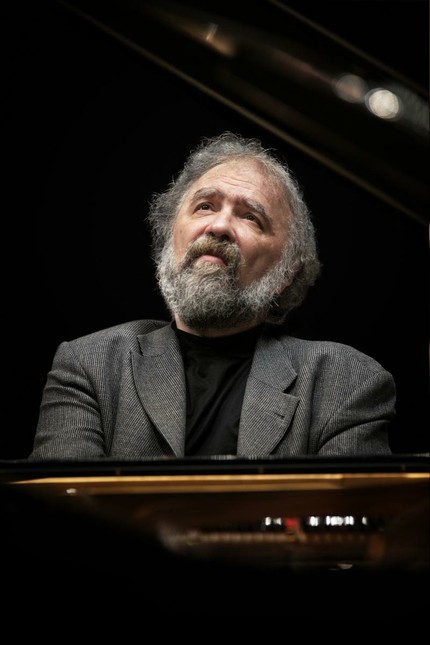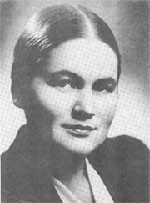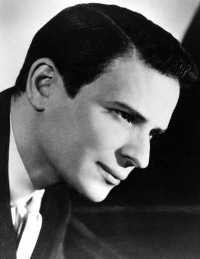
Radu Lupu (Radu Lupu) |
Radu Lupu

At the start of his career, the Romanian pianist was one of the competitive champions: in the second half of the 60s, few could compare with him in terms of the number of awards received. Starting in 1965 with the fifth prize at the Beethoven Competition in Vienna, he then successively won very strong “tournaments” in Fort Worth (1966), Bucharest (1967) and Leeds (1969). This series of victories was based on a solid foundation: from the age of six he studied with Professor L. Busuyochanu, later took lessons in harmony and counterpoint from V. Bikerich, and after that he studied at the Bucharest Conservatory. C. Porumbescu under the direction of F. Muzycescu and C. Delavrance (piano), D. Alexandrescu (composition). Finally, the final “finishing” of his skills took place in Moscow, first in the class of G. Neuhaus, and then his son St. Neuhaus. So the competitive successes were quite natural and did not surprise those who were familiar with Lupu’s capabilities. It is noteworthy that already in 1966 he began active artistic activity, and the most striking event of its first stage was not even competitive performances, but his performance in two evenings of all Beethoven concerts in Bucharest (with an orchestra conducted by I. Koit). It was these evenings that clearly showed the high qualities of the pianist’s playing – the solidity of technique, the ability to “sing on the piano”, stylistic sensitivity. He himself mainly attributes these virtues to his studies in Moscow.
The past decade and a half have turned Radu Lupu into a world celebrity. The list of his trophies has been replenished with new awards – awards for excellent recordings. A few years ago, a questionnaire in the London magazine Music and Music ranked him among the “five” best pianists in the world; for all the conventionality of such a sports classification, indeed, there are few artists who could compete with him in popularity. This popularity is based primarily on his interpretation of the music of the great Viennese – Beethoven, Schubert and Brahms. It is in the performance of Beethoven’s concertos and Schubert’s sonatas that the artist’s talent is fully revealed. In 1977, after his triumphant concerts at the Prague Spring, the prominent Czech critic V. Pospisil wrote: “Radu Lupu proved with his performance of the solo program and Beethoven’s Third Concerto that he is one of the five or six leading pianists of the world, and not only in his generation. His Beethoven is modern in the best sense of the word, without sentimental admiration for unimportant details – exciting in fast, calm, poetic and melodious in lyrical and free parts.
No less enthusiastic responses were caused by his Schubert cycle of six concerts, held in London in the 1978/79 season; most of the composer’s piano works were performed in them. One prominent English critic noted: “The charm of the interpretations of this amazing young pianist is the result of an alchemy too subtle to be defined in words. Changeable and unpredictable, he puts a minimum of movements and a maximum of concentrated vital energy into his game. His pianism is so sure (and rests on such an excellent foundation of the Russian school) that you hardly notice him. The element of restraint plays a significant part in his artistic nature, and certain signs of asceticism are something that most young pianists, seeking to impress, usually neglect.
Among the advantages of Lupu is also a complete indifference to external effects. The concentration of music-making, the subtle thoughtfulness of nuances, the combination of the expressive power of expression and contemplation, the ability to “think at the piano” earned him the reputation of “the pianist with the most sensitive fingers” in his generation.
At the same time, it should be noted that connoisseurs, even those who highly appreciate Lupu’s talent, are not always unanimous in their compliments about his specific creative achievements. Definitions such as “changeable” and “unpredictable” are often accompanied by critical remarks. Judging by how contradictory the reviews of his concerts are, we can conclude that the formation of his artistic image has not yet ended, and successful performances occasionally alternate with breakdowns. For example, the West German critic K. Schumann once called him “the embodiment of sensitivity”, adding that “Lupu plays music the way Werther would play the night before he emptied a gun into his temple.” But almost at the same time, Schumann’s colleague M. Meyer argued that Lupu “everything is calculated in advance.” You can often hear complaints about the artist’s rather narrow repertoire: Mozart and Haydn are only occasionally added to the three names mentioned. But in general, no one denies that within the framework of this repertoire, the artist’s achievements are very impressive. And one cannot but agree with a reviewer who recently said that “one of the most unpredictable pianists in the world, Radu Lupu can rightfully be called one of the most compelling when he is at his best.”
Grigoriev L., Platek Ya., 1990





